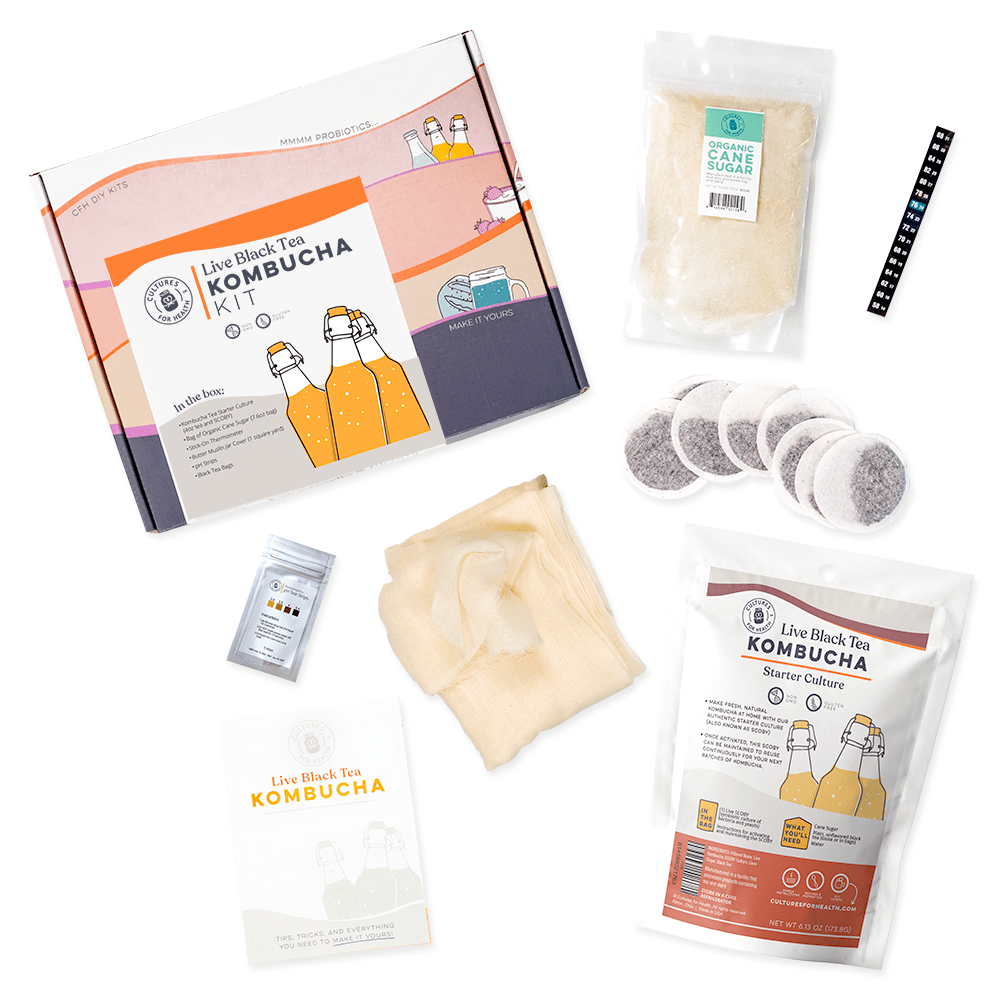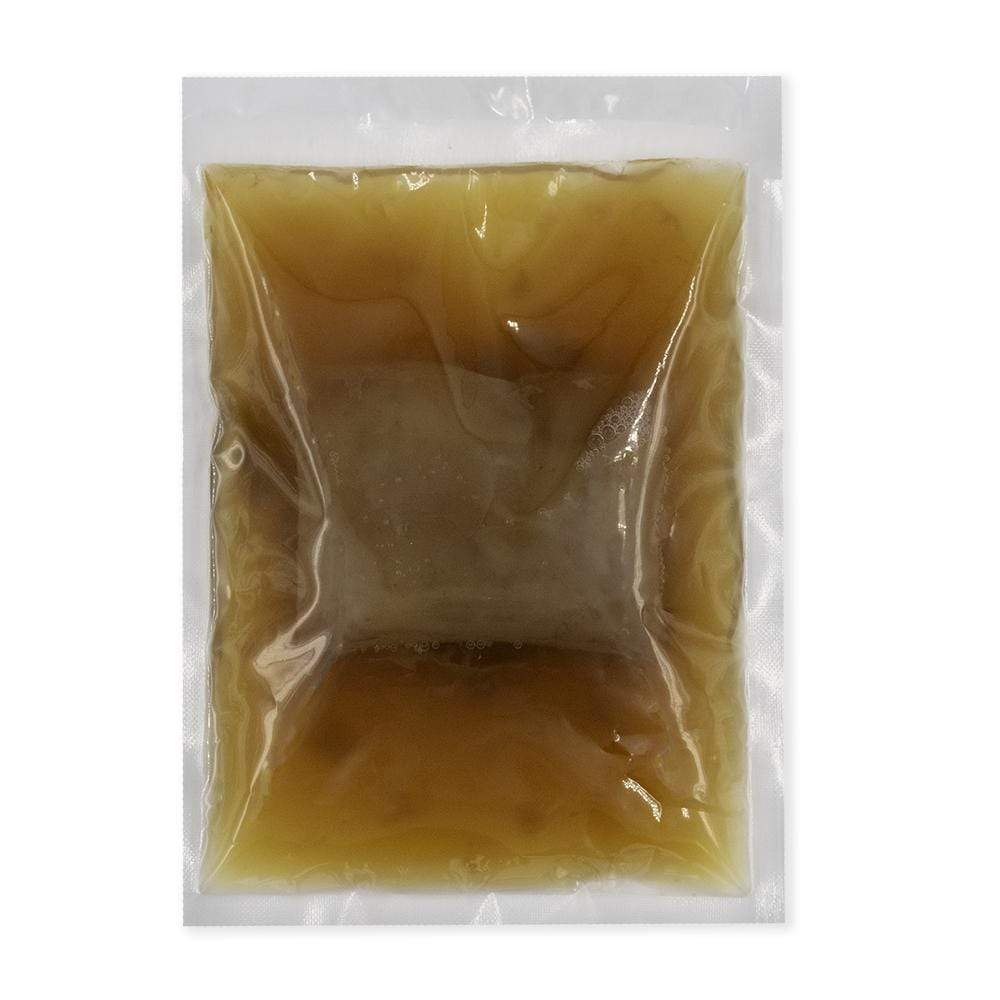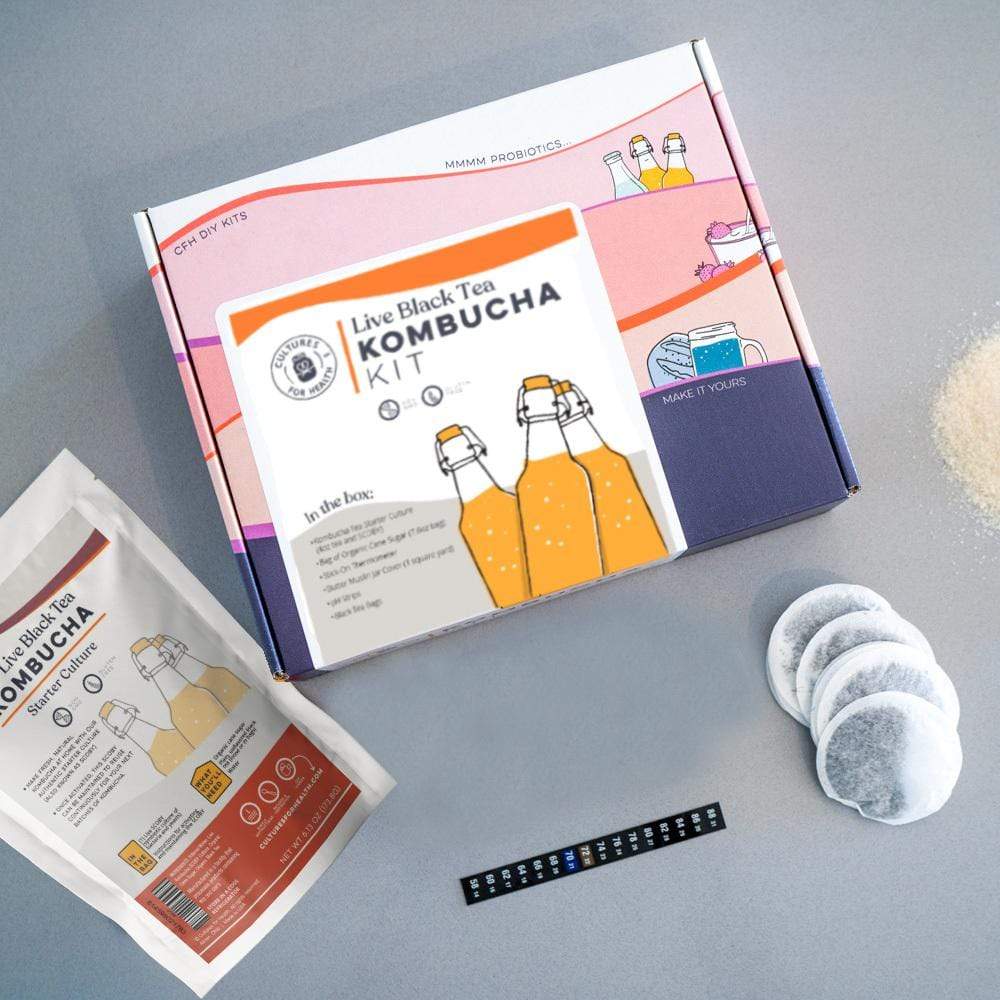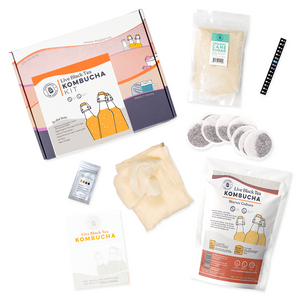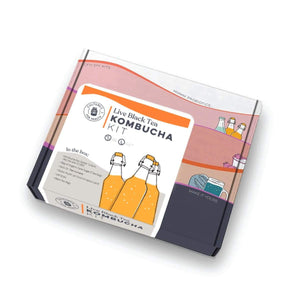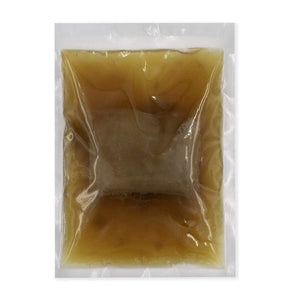
If you're into fermented foods and drinks, you've probably heard of kombucha. This trendy drink has been making waves in the wellness world for its many health benefits.
One of the reasons for this is its probiotic content. But is kombucha probiotic? Does it have enough of those friendly bacteria to actually make a difference in your gut health? That’s what we’re here for.
In this article, we'll answer these questions and explore kombucha probiotics properties. We'll also discuss why making your own brew at home is far better than any store-bought kombucha.
What is Kombucha, and Does It Have Probiotics?

Kombucha is a fizzy sweet-and-sour fermented tea that has been used for hundreds of years. It’s also sometimes referred to as “mushroom tea” because the kombucha SCOBY resembles a mushroom cap. The origins of kombucha are still a bit of a mystery, but many believe it originated in China before making its way to Japan and Russia.
Kombucha is made by adding the following:
-
tea (black, white, or green, etc.)
-
sugar
The mixture is then allowed to ferment for 7–30 days, depending on the temperature of your environment. The fermentation process produces acetic acid that gives kombucha its distinctive taste.
Now to your main question, does kombucha have probiotics? The answer is yes! Kombucha is probiotic.
Live Black Tea Kombucha Starter Kit
During the fermentation process, the SCOBY breaks down the sugars in the tea. It also produces organic acids, vitamins, and minerals, as well as more than 50 different varieties of probiotics. These include Bifidobacteria, Lactobacillus, and Acetobacter. These probiotics have long been touted for their potential to support gut health and boost overall wellness.
See Related: What is a SCOBY?
How Does Kombucha Compare to Other Probiotics?
When it comes to probiotics, there are many different types available in the market—for instance, probiotic supplements, yogurts, and fermented foods like kimchi and sauerkraut. So how does kombucha compare to these other sources of probiotics?
First of all, kombucha contains a diverse range of probiotics, including both LAB and AAB. This variety of kombucha probiotics can be super beneficial for your health and wellness. Plus, different strains of probiotics in kombucha have different effects on the gut microbiome.
Secondly, kombucha is a low-calorie and low-sugar alternative to other probiotic sources. Some probiotics, such as yogurts, can be high in calories and added sugars, which can be detrimental to your health if consumed in excess.
Important Note: The probiotic content in kombucha varies depending on the formulation and fermentation conditions used. Moreover, different probiotics offer varying health benefits, depending on their specific strains of bacteria. Thus, we recommend consuming a variety of probiotic-rich foods for a diverse range of beneficial microorganisms in your gut.
How Does Kombucha Benefit Gut Health?

Kombucha can improve gut health in various ways. Firstly, it contains live bacteria and yeast, which can populate the gut with beneficial microorganisms. These microorganisms help restore the balance of gut bacteria, which can be disrupted by factors like antibiotics, poor diet, or stress.
Secondly, kombucha has organic acids that help maintain the acidity of the gut. This is important in preventing harmful bacteria growth and promoting beneficial bacteria growth.
Thirdly, kombucha also contains antioxidants and acetic acid that help reduce inflammation in the gut. Inflammation in the gut is a contributing factor to conditions like irritable bowel syndrome (IBS) and inflammatory bowel disease (IBD).
Also, some bacterial strains found in kombucha, such as Lactobacillus and Bifidobacterium, can reduce inflammation and even improve mental health.
Overall, more research is needed on kombucha probiotics to fully understand how kombucha manifests its potential gut health benefits. However, the combination of live microorganisms, organic acids, and antioxidants makes it a promising option for improving gut health.
See Related: Kombucha Benefits and Dangers
Other Health Benefits of Kombucha
Beyond its probiotic content, kombucha also boasts a wealth of antioxidants, organic acids, and polyphenols. The presence of these compounds contributes to the various kombucha benefits, including:
Improve Liver Health
Studies on animals have shown that kombucha tea may be helpful in reducing the effects of liver damage. In one such study, researchers tested different amounts of kombucha tea on lab mice. The results showed that it not only lowered oxidative stress and inflammation, but prevented fat buildup in the liver as well.
In another study, mice that were treated with kombucha tea experienced changes in their intestinal microbiota—specifically, they had an increase in the proportion of Bacteroidetes, plus an abundance of beneficial probiotic bacteria such as Lactobacillus. The study suggested that the presence of probiotic bacteria in the gut, particularly Lactobacillus, may play a role in alleviating non-alcoholic fatty liver disease.
May Help Manage Type II Diabetes
Kombucha has also been found to have several benefits for people with Type II diabetes. It can lower blood sugar levels and increase insulin sensitivity, both of which can help with managing the disease. In 2012, researchers at the University of Sfax conducted a study on rats with diabetes, and found that those who consumed kombucha had lower levels of blood glucose compared to the rats in the control group.
May Boost Heart Health
A handful of animal studies have shown that kombucha tea may have heart health benefits. Research has linked kombucha use to better cholesterol levels and reduced risk of arteriosclerosis.
In a 2011 study on rats, it was found that kombucha reduced total cholesterol levels by up to 52%. The bad cholesterol (LDL) was reduced by as much as 91%, while the good cholesterol (HDL) increased by up to 27%.
Another study on rats in 2012 showed similar results; they found that those who drank kombucha had lower cholesterol levels and lost more weight compared to those who drank regular black tea.
Can Assist in Weight Loss

Kombucha also has some exciting benefits for those of you who are trying to lose weight.
A handful of studies have shown that kombucha can reduce cravings and improve digestion. It may also help your body get rid of toxins, since it contains enzymes and acids that promote detoxification.
In animal studies, rats who drank kombucha had lower levels of body fat compared to those who didn't drink it. Diabetic rats who drank green tea kombucha were also found to have lower body weights than those who didn't drink it.
May Help Relieve Asthma Symptoms
Another potential benefit of kombucha is its ability to provide relief for people with asthma. Several studies have suggested that kombucha made with black tea can increase the levels of theophylline, which is a medication used for asthma treatment.
The amount of theophylline found in kombucha is considered to be a therapeutic dose for people using it as a treatment for asthma. Additionally, kombucha contains caffeine and heparin, both of which have also been linked to the relief of asthma symptoms.
See Related: Does Kombucha Have Caffeine?
Improves Joint Pain
Adding kombucha to your diet can also do wonders for your joint health. This is because it contains glucuronic acid, which can be converted by the body into various acidic mucopolysaccharides. These include hyaluronic acid, chondroitin sulfate, and glucosamine. These compounds are crucial for keeping your joints healthy and pain-free while also helping to prevent arthritis.
May Help Prevent Cancer
Studies have shown that kombucha tea has higher levels of antioxidants than regular tea, which is great for your health. Antioxidants can help prevent cancer by keeping free radicals in balance.
Kombucha is also known for its cancer-killing properties. One study found that black tea kombucha was more effective at destroying Caco-2 colorectal cancer cells than normal cells.
The exact mechanisms of kombucha's anticancer abilities are not fully understood yet. However, researchers suggest that the active components from tea leaves and metabolites released from SCOBY activity play a crucial role.
May Improve Mental Health
Mental health is a crucial aspect of our overall well-being. While there are many treatment options available for anxiety and depression, researchers are exploring the potential of probiotics, including those found in kombucha, to help improve mood and mental health.
Studies have suggested that probiotics can help regulate the gut-brain axis, a communication pathway between the digestive system and the central nervous system. This means that the health of your gut can impact your mental health, and vice versa.
By consuming kombucha probiotics, you may be able to support a healthier gut and potentially improve symptoms of anxiety and depression.
Why Brew Your Own Kombucha?
We totally get that store-bought kombucha is a convenient option—but trust us, brewing your own kombucha will offer you a fresher, livelier, and more diverse set of kombucha probiotics. It will also allow you to customize the flavor and sweetness to your liking.
Additionally, brewing your own kombucha can also save you money and help reduce waste. By reusing the SCOBY and fermenting your own tea at home, you can cut the cost of shipping and the waste associated with single-bottle packaging.
If you're interested in trying it out, we recommend checking out our article, Homemade Kombucha Recipe. Who knows? It might become your new favorite hobby and a great addition to your healthy lifestyle.













